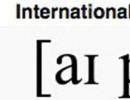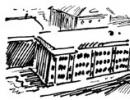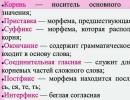Insensitive. insensitive short adjective
Majority quality adjectives has two forms - full and short: talented - talented; noble - noble; wayward - wayward; ferocious - ferocious.
In modern Russian, the short form is formed from the stem of the full form with endings: zero for the masculine gender, -а, -о (respectively for the feminine and neuter genders. Sometimes a fluent vowel -е- appears between the final consonants of the stem in masculine forms).
In this case, it is necessary to pay attention to the following: for many adjectives ending in -stvenny, -enny, a short form singular the masculine gender has a truncated suffix: peculiar - peculiar; solemn - solemn: essential - essential; painful - painful; related - related, etc. The formation of precisely forms with a truncated suffix, according to the observations of scientists, reflects the trend in the development of this group of adjectives in the modern Russian language. Parallel forms that arise in the practice of their use (immoral - immoral, insensitive - insensitive, numerous - numerous, mysterious - mysterious, etc.) are permissible, but the variant in -en is more strict, and not in -enen.
Only a small number of adjectives in this group form short forms ending in -enen: arrogant, inviolable, unquestionable, ordinary, frank, penetrating, respectable, timely and some. others
Not all qualitative adjectives form a short form. They don't have it:
1) adjectives with suffixes -sk-, -ichesk-, -ensk-, -ov, -ev-, a number of adjectives with the suffix -n-: "boorish act", "ironic notes", "prudish voice", "ordinary employee ", "key problem", "early morning";
2) some verbal adjectives, with the suffix -l-: experienced, melted; as well as many adjectives that are real participles in origin: outstanding (abilities), swollen (face), etc .;
3) many adjectives with subjective assessment suffixes: fat, reddening, clean, unpretentious;
4) many adjectives relative in origin denoting colors: coffee, chocolate, lilac;
5) adjectives denoting the colors of horses: buckskin, black, bay, savrasy;
6) words: younger, older, big, as well as some colloquial words: lesser, cursed, etc.
There are such high-quality adjectives that are used only in a short form, but do not have a full form: glad, much, love, necessary.
Some multi-valued adjectives do not form a short form for each of the meanings. For example, the adjective has three meanings: 1) visible, visible; 2) significant, important; 3) tall, stately, representative, the short form is only in the first meaning: "The house is visible from afar."
There are adjectives in which the full and short forms differ in meaning. For example: domineering - inclined to command, subjugate himself ("powerful man") and domineering - "having the power to dispose, command" ("We are not in power in our fate" - P.); due - "as it should be, appropriate, appropriate" ("to show due attention") and must - "obliged" ("... I had to prepare a samovar for the masters" - M.G.); "We owe Yegor for five months ... We should not start salaries for servants" - Ch.).
It is interesting to pay attention to the following. Although the presence of a short form is traditionally considered a specific grammatical feature of quality adjectives, some relative adjectives also have it. Thus, the 4-volume "Dictionary of the Russian Language" of the Academy of Sciences of the USSR gives a short form to such, for example, adjectives as childless, homeless, unarmed, free, pregnant, unprecedented, monochrome, etc., which are relative, since: 1) denote a sign that cannot be quantitatively changed; 2) have synonymous constructions with the word from which they are formed: childless - not having children, homeless - not having a home, unprecedented - not having a precedent, one-color - painted in one color, etc.; 3) do not change in degrees of comparison.
Rakhmanova L.I., Suzdaltseva V.N. Modern Russian language. - M, 1997.
Online Spelling Guide,
pronunciation, literary editing
A Guide to Spelling and Literary Editing
Rosenthal D.E.
§ 162. Variant forms of full and short adjectives
1. In pairs of full adjectives in the instrumental case, for example: evening dawn - evening dawn, wooden spoon - wooden spoon, the second forms are obsolete; in poetic speech these options are equal.
Note. In the pair of God - God, the second form is used in a high style.
2. Variants of short forms of adjectives are equal (on -en and -enen) formed from full forms with unstressed -enny, for example: inactive - inactive; immoral - immoral; groundless - groundless; insensitive - insensitive; majestic - majestic; militant - militant; the only one - the only one; natural - natural; malignant - malignant; artificial - artificial; slow - slow; powerful - powerful; courageous - courageous; ignorant - ignorant; responsible - responsible; subordinated - subordinated; mediocre - mediocre; related - related; characteristic - peculiar; correspondingly - correspondingly; essential - essential; mysterious - mysterious identical - identical; clear - clear.
Forms fearless, lifeless, impeccable, meaningless, painful, ambiguous, frivolous, numerous, hostile do not allow options.
3. Short adjectives differ in -enen and short participles -en. Wed:
the case is quite definite (clear) - the date of departure has already been determined (established, scheduled);
the old man is very respectable (worthy of respect) - the hero of the day is honored by our attention (he was honored with attention);
the actor’s appearance is forced (stretched, unnatural) - the brother is forced to leave (does it under duress).
4. Some adjectives in short form have a fluent vowel between the final consonant of the root and the suffix, while others have no fluent vowel in these cases. Wed:
A) sour - sour, light - light, warm - warm;
- b) round - round, wet - wet, swarthy - swarthy, rotten - rotten. The shape is sharp with a normative sharp is acceptable in the sense of "having a good piercing or cutting end."
Short Form Education
Most quality adjectives have two forms - full and short: talented - talented;noble - noble;wayward - wayward; ferocious - ferocious.
In modern Russian, the short form is formed from the stem of the long form * with endings: zero for masculine, -a ,-about (respectively for feminine and neuter genders. Sometimes a fluent vowel appears between the final consonants of the stem in masculine forms -e- ).
* AT Old Russian full forms, on the contrary, were secondary and were formed from more ancient short forms by adding demonstrative pronouns to them u(b)yu, n, performing a function similar to the functions of definite articles in Western European languages: good + and(b)® kind;of good + yu ® kind; good + n ® good etc.
In this case, it is necessary to pay attention to the following: for many adjectives ending in -stvenny ,-enny, the short form of the masculine singular has a truncated suffix: characteristic - characteristic;solemn - solemn:significant - significant;painful - painful; related - kindred etc. The formation of precisely forms with a truncated suffix, according to the observations of scientists, reflects the trend in the development of this group of adjectives in the modern Russian language * Parallel forms that arise in the practice of their use ( immoral - immoral, insensible - insensible, numerous - numerous, mysterious - mysterious etc.) are admissible, but the variant on -en , not on –enen **.
* Cm.: Graudina L.K., Itskovich V.A., Katlinskaya L.P. Decree. op. pp. 231–232.
** Therefore, the following cases of using adjectives in newspaper texts are unfortunate: "Next - work with young families. Who is responsible for the implementation of the plan? Almost everyone" (Koms. pr. 1987. May 22); "This model can take off from a very short runway, and in general such an aircraft is more maneuverable. The span of the main wings is about 16 meters" (Koms. Pr. 1989. July 16). Forms with a truncated suffix should have been used: responsible, flexible.
Only a small number of adjectives in this group form short forms ending in
-enen:haughty, inviolable, undoubted, ordinary, frank, penetrating, venerable, timely and some others
Not all qualitative adjectives form a short form *. They don't have it:
1) adjectives with suffixes –sk-, -ichesk-, -ensk- ,-ov,-ev-, a series of adjectives with a suffix -n- : "boorish deed", " ironic notes", " sanctimonious voice", " Private employee", " key problem", " early morning";
2) some verbal adjectives, with a suffix -l- : seasoned, mellow; as well as many adjectives that are real participles in origin: outstanding(capabilities), swollen(face), etc.;
3) many adjectives with subjective evaluation suffixes: thick, blushing, clean, unpretentious;
4) many relative adjectives denoting colors: coffee, chocolate, lilac;
5) adjectives denoting the colors of horses: buckskin, black, bay, savrasy;
6) words: junior, senior, big, as well as some vernacular words: smaller, ugly and etc.
* The vast majority of these adjectives do not form synthetic forms of degrees of comparison either.
There are such qualitative adjectives that are used only in a short form, but do not have a full form: glad, much, love, necessary.
Some multi-valued adjectives do not form a short form for each of the meanings. For example, the adjective prominent, having three meanings: 1) visible, visible; 2) significant, important; 3) tall, stately, representative, the short form is only in the first meaning: "House visible from afar."
There are adjectives in which the full and short forms differ in meaning. For example: overbearing - inclined to command, to subdue oneself (" overbearing man") and domineering -"having the power to dispose, command" ("Not domineering we are in our destiny" - P.); due -"as it should be, appropriate, appropriate" ("show due attention") and must -"must" ("... I must was to prepare a samovar for the masters" - M.G.); "We Egor must for five months ... You should not start salaries for servants "- Ch.).
It is interesting to pay attention to the following. Although the presence of a short form is traditionally considered a specific grammatical feature of quality adjectives, some relative adjectives also have it. Thus, the 4-volume "Dictionary of the Russian Language" of the Academy of Sciences of the USSR gives a short form to such, for example, adjectives as childless, homeless, unarmed, free, pregnant, unprecedented, single color etc., which are relative, since: 1) they denote a sign that cannot be quantitatively changed; 2) have synonymous constructions with the word from which they are formed: childless - having no children homeless - having no home unprecedented - without precedent, monochrome - painted in one color, etc.; 3) do not change in degrees of comparison.
INFENCING
["ust], -th, -th; endless "sensual, -enna
1) Deprived of the ability to feel.
Unfeeling body.
The worst thing of all is that you are now standing in front of me like an insensitive pillar (Dostoevsky).
2) Deprived of sensitivity, cordiality, imbued with cold indifference.
Insensitive father.
[Daria Alexandrovna] felt that she was turning pale and her lips were trembling with anger at this cold, insensitive person (L. Tolstoy).
Synonyms:
bezuch "asty, heartless" eternal, not "duck, indifferent" ear, fat "ozhy (colloquial), cold" one
Antonyms:
responsive, h "duck
3) Expressing insensibility, indifference.
Insensitive look.
Synonyms:
cold
Related words:
senseless, senseless, senseless, senseless
Etymology:
Borrowed from the Old Church Slavonic language, in which it is a derivational tracing paper of the Greek anaisthetos (an ‘without’, ‘not’ and aisthetos ‘sensual’, ‘perceived by the senses’).
A culture of speech:
short form the adjective insensible has no variants within the literary norm.
Popular explanatory-encyclopedic dictionary of the Russian language. 2012
See also interpretations, synonyms, meanings of the word and what is SENSITIVE in Russian in dictionaries, encyclopedias and reference books:
- INFENCING in encyclopedic dictionary:
, -th, -th; -ven, -ve-nna. 1. Deprived of feelings (in 2 meanings), consciousness. In an unconscious state, someone (unconscious). 2. Deprived… - INFENCING in the Full accentuated paradigm according to Zaliznyak:
emotionless, emotionless, senseless, senseless, senseless, senseless, senseless, senseless, senseless, senseless, senseless, senseless, senseless, senseless, senseless insensible, insensible, insensible, insensible, insensible, insensible, insensible, insensible, insensible, ... - INFENCING in the Dictionary of synonyms of Abramov:
see ruthless, passionless, cruel, ungrateful, ... - INFENCING in the dictionary of Synonyms of the Russian language:
apathetic, apathetic, soulless, indifferent, indifferent, heartless, lethargic, wooden, indifferent, stony, insensitive, unmerciful, insensitive, insensitive, unconscious, dead, indifferent, hard-skinned, thick-skinned, torpid, ... - INFENCING in the New explanatory and derivational dictionary of the Russian language Efremova:
adj. 1) a) Deprived of the ability to feel, lost consciousness. b) Characterized by loss of consciousness. 2) a) trans. Not showing interest in the environment; … - INFENCING in the Dictionary of the Russian Language Lopatin:
- INFENCING in the Spelling Dictionary:
insensitive; cr. f. -ven and -venen, ... - INFENCING in the Dictionary of the Russian Language Ozhegov:
devoid of a sense of compassion, responsiveness B. a person. insensible devoid of feelings N2, creatures In an insensible state, someone. (without … - INFENCING in the Explanatory Dictionary of the Russian Language Ushakov:
(moustache), insensible, insensible; insensitive, insensitive, insensitive. 1. Deprived of the ability to feel; accompanied by loss of feelings (book). It is the same for an insensible body to rot everywhere. Pushkin. … - INFENCING in the Explanatory Dictionary of Efremova:
insensitive adj. 1) a) Deprived of the ability to feel, lost consciousness. b) Characterized by loss of consciousness. 2) a) trans. Showing no interest in... - INFENCING in the New Dictionary of the Russian Language Efremova:
adj. 1. Deprived of the ability to feel, lost consciousness. ott. Characterized by loss of consciousness. 2. trans. Not showing interest in the environment; indifferent, indifferent. … - INFENCING in the Big Modern Explanatory Dictionary of the Russian Language:
adj. 1. Deprived of the ability to feel, lost consciousness. ott. Characterized by loss of consciousness. 2. trans. Not showing interest in the environment; indifferent, indifferent. … - CHOKING (BOOK) at Wiki Quote.
- DAVID BOWIE at the Wiki Quote:
Data: 2009-09-05 Time: 11:03:23 * I have always felt like an instrument of some higher power, but what exactly drives me is up to ... - VIOLENT in the Concise Church Slavonic Dictionary:
- hard-hearted, insensitive, stubborn, ... - TRINITY-SERGIEV DESERT in the Orthodox Encyclopedia Tree:
Open Orthodox Encyclopedia "TREE". Trinity-Sergius Primorskaya hermitage, monastery. Address: Russia, 193000, St. Petersburg, Petersburg highway, ... - TORPID in Medical terms:
(lat. torpidus numb, insensible) lethargic, inactive (about the flow ... - TORPID PHASE OF SHOCK in Medical terms:
(Latin torpidus numb, insensible) phase of traumatic shock, following the erectile and characterized by developed inhibition of c. n. with., weakening of the functions of the cardiovascular ... - MAYAKOVSKY in the Literary Encyclopedia.
- ISTAKAN in the Big Encyclopedic Dictionary:
pagan god, idol, statue. In a figurative sense - stupid, insensitive or indifferent, heartless ... - ISTAKAN in big Soviet encyclopedia, TSB:
a statue that is worshiped as a deity; idol, idol. In a figurative sense - a stupid, insensitive person, indifferent to ... - JEFFRIES GEORGE in the Encyclopedic Dictionary of Brockhaus and Euphron:
(Lord Jeffreys) - English chancellor (1640-1689). Already in his early youth, he showed himself to be a rude, immoral cynic. Being engaged in advocacy, he rotated among ...






